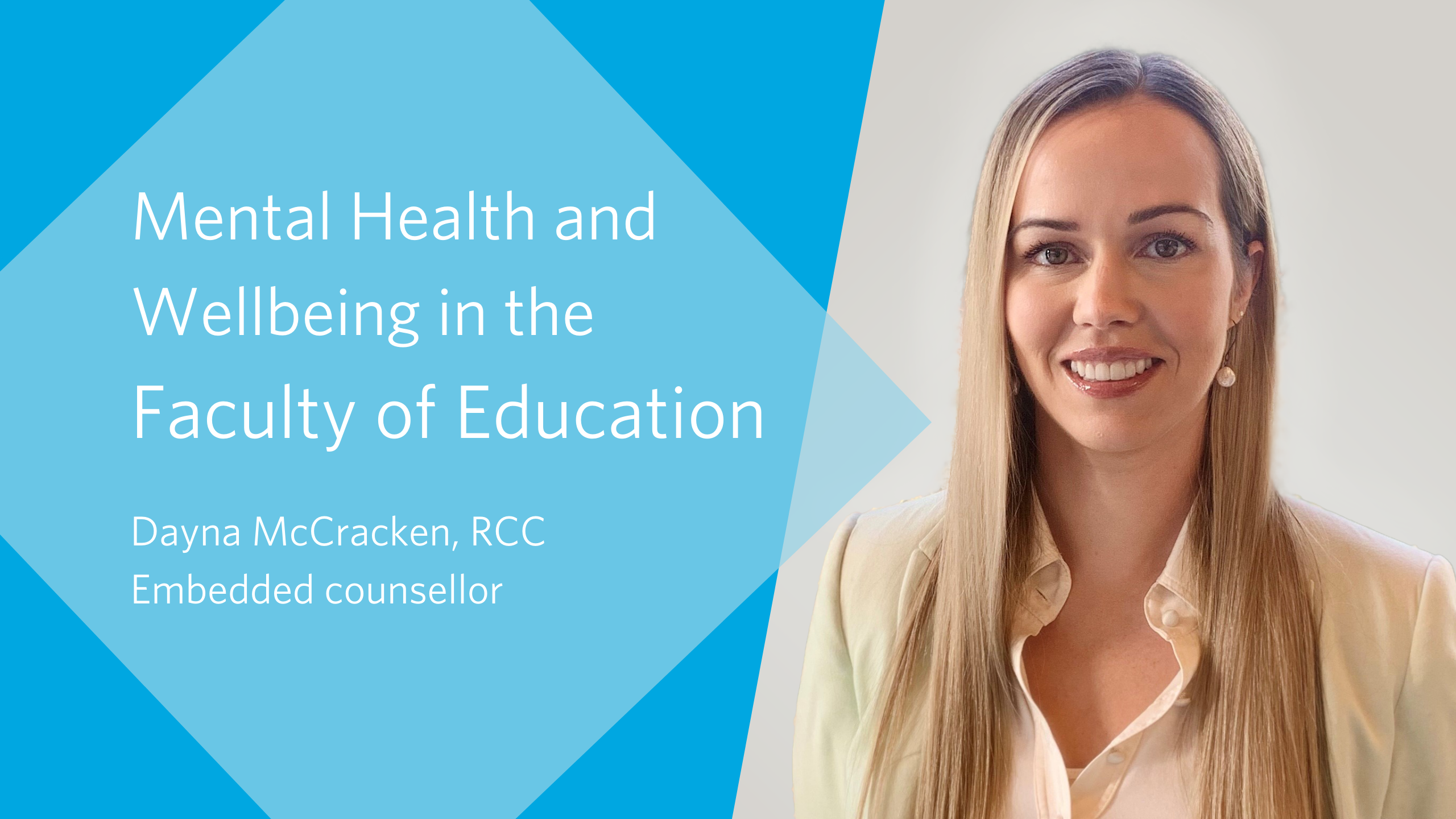December 9, 2021

Dayna McCracken, Faculty of Education Embedded Counsellor
Dayna McCracken is a Registered Clinical Counsellor who is “embedded” in the Faculty of Education and is specialized in helping Faculty of Education students. Dayna provides workshops and outreach support tailored specifically to the concerns that Faculty of Education students commonly experience. She can also meet students individually to find out more about their particular concerns, working collaboratively to make a wellness plan that is right for them.
Dayna has worked as a Clinical Counsellor in a variety of settings, including non-profit agencies, provincial mental health treatment centres, public mental health clinics and private practice. Her clinical counselling experience spans across a wide range of practice areas, including issues related to anxiety, stress, depression, relationship and attachment issues, trauma, as well as work, school, and life balance. Dayna utilizes evidence-based approaches to assist clients in attaining their counselling goals, including Cognitive Behavioural Therapy (CBT), Solution-Focused Therapy and Dialectical Behavioural Therapy (DBT).
Dayna strives to provide a warm, caring space where clients can express themselves, work through their challenges and feel heard. It is of great importance to Dayna to work with clients towards their own personal goals and towards changes that they would like to see in their life. It is paramount in her practice that clients always feel safe and comfortable during a counselling session, and that they leave feeling empowered, positive and with greater peace and clarity.
Booking Procedure
To book a counselling session with Dayna, please contact Counselling Services directly at 604.822.3811 and identify yourself a Faculty of Education student. Counselling Services’ front desk staff will be able to guide you through booking directly with Dayna, filling out the intake forms and answering any questions you may have about the process.
If you are faculty or staff and would like to book a consultation with Dayna, please email directly at dayna.mccracken@ubc.ca.
Dayna’s office is located at Ponderosa Commons North.
More about Counselling at UBC
As a UBC student, you are working to achieve your academic goals and make a positive contribution to your world, while coping with challenges that can impact your capacity to learn and thrive. At times, you may feel overwhelmed and need to reach beyond your usual sources support for a new perspective, to help you make changes in your life. At UBC you have a lot of different kinds of supports available for your mental health and wellbeing.
Counsellors are located at various locations on campus: at the main Counselling Services Centre, as well as embedded in several faculties and departments.
UBC Counsellors respect that students have unique personalities, cultures and experiences and they strive to bring a multicultural, anti-oppressive social-justice orientation to the counselling process.
Students often seek counselling for help with decision-making, navigating family and social relationships, major transitions and identity development. Counselling can also help students who are experiencing mental health concerns including depression, anxiety and the impacts of traumatic experiences. Counsellors at UBC also specialize in helping students overcome issues that cause academic distress such as procrastination, exam anxiety, perfectionism and problems with attention and motivation.
The counsellor who is embedded in the Faculty of Education is a member of the Counselling Services team and can help you navigate the full range of services that are available to you. You are also able to connect with UBC Counselling Services Centre for a full range of on-campus supports including Wellness Advising, same-day single-session appointments, brief counselling and group therapy programs.
No matter what issues you want to address, UBC counselling staff will get to know you and find out what kind of support will work best in your particular situation. Sometimes a single session is enough for now, to give you some new tools and new ways of thinking about your problem. Sometimes a group therapy program or a brief course of individual counselling sessions would be most helpful.
Additional Resources for UBC Students
- Visit Student Health Services to see a doctor, nurse, or other medical professional on campus
- Check out Health and Wellbeing at UBC to explore a range of resources
- Get resources for coping with the mental health challenges of COVID-19
- UBC Student Assistance program offers a free 24/7 counselling and life coaching service, accessible anywhere in the world. The service is offered in multiple languages by phone, video-counselling, and more.
- At the UBC Wellness Centre you can get tips and resources on stress, studying and navigating university life
Help a Friend
Find information here about how to help if you’re concerned about a friend who is feeling hopeless or thinking of harming themselves.
Crisis Support
If you need crisis support or you’re currently in distress, the following resources are available 24 hours/day, 7 days/week:
- Emergency Services: 911
- UBC Campus Security: 604.822.2222
- Hope for Wellness Line offers immediate mental health counselling and crisis intervention to all Indigenous peoples across Canada. 1.855.242.3310
- Vancouver Crisis Line: 1.800.784.2433
- Access and Assessment Centre: 604.675.3700 (walk-in’s 7:30am – 9:30pm)
- Victim Link: 1.800.563.0808
- Urgent Care, UBC Hospital: 2211 Wesbrook Mall (8am – 10pm). Urgent care or go to the nearest hospital emergency department.